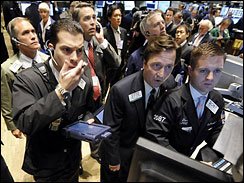Game analysts sound off on market crisis
Sebastian: "Investors are shooting first and asking questions later"; Pachter: "Worst I've seen," publishers have long road ahead to regain 2007-level share value.
At 4 p.m. EDT today, US stock markets closed, ending one of the most tumultuous weeks on record. Today, the Dow Jones Industrial Average rose and fell dramatically within a 1,000-point range, eventually ending the day at 8,451.19. The one-day 128-point, 1.5 percent drop capped the worst week in the index's history, which saw a 1,874-point, 18.2 percent decline in just seven days.
Since the beginning of the year, the DJIA, made up of 30 "blue-chip" firms such as ExxonMobil and IBM, is down a staggering 40 percent. The NASDAQ composite is faring even worse, down 41.3 percent for the year. Most game publishers are listed on the NASDAQ, and like the rest of the tech-heavy market, they have been taking their lumps in recent weeks. The drastic declines have torpedoed the long-held perception that the game industry is recession-proof--or at least recession-resistant.
"Clearly investors are shooting first and asking questions later," said Colin Sebastian, senior vice president of Equity Research at Lazard Capital Markets. "The broader market sell-off isn't leaving any sector untouched, and is certainly impacting the video game sector, given its exposure to fourth-quarter consumer spending."
But are game publishers faring any worse than the rest of the market? "The declines are mostly market-driven, with broad indexes off around 40-plus percent from their October 2007 highs," explained Michael Pachter, top game-industry analyst for Wedbush Morgan. "That means that the average stock is down 40 percent over the last year."
Pachter explained that though games have been touted as cost-effective entertainment to penny-pinching consumers on "staycations," they're still a nonessential expense. "The market is down for a bunch of reasons, but the one that is most relevant to the game publishers is the waning confidence in consumer demand. This means that companies making discretionary consumer products are probably down more than 40 percent, while companies making consumer staples (soup or toothpaste) are probably down less than 40 percent."
How are game stocks faring? According to GameSpot's own research, THQ has lost 68 percent of its value in the past year, worse than the grim 40 percent average from October 2007. Pachter blames THQ's steeper decline on a prolonged hangover from last holiday season, when the once-cash-flush publisher's earnings were far below expectations.
Also worse than average is Electronic Arts, down 54 percent due to disappointing earnings and revised guidance. Take-Two's 29 percent loss is less than the 40 percent Oct. 2007-Oct. 2008 loss benchmark, thanks to "Grand Theft Auto [sales] and the potential for EA to come back," said Pachter, referencing the publisher's now-scrapped takeover bid. However, the company's share price is now half the $26-per-share offer EA made back in February.
For the most part, Sebastian concurred with his colleague, but also offered another factor. "We believe some retailers are exercising a little more caution in their up-front buying of video games and other products, which is understandable given what's occurred over the past couple of weeks," he explained. "However, at this point, the industry appears to remain fairly stable--in other words, resilient but not immune from the weaker economy."

That said, Pachter believes that one publisher will be extra-resilient. Unsurprisingly, that company is Activision-Blizzard, which the analyst is still bullish on despite its 28 percent stock slide during the past month.
"They are a completely different company with the Vivendi Games merger, so their value this year doesn't compare with their value last year," he explained. "I think that the market will learn to appreciate that World of Warcraft is like crack cocaine, and probably benefits from a recession." The affable analyst went on to deadpan that, "unemployed subscribers can play 100 hours a week--a phenomenal value."
Gallows humor aside, Pachter doesn't believe that game publishers' share prices will be bouncing back anytime soon. "These stocks will remain depressed as long as the market is depressed," he said. "The question is what happens if games are recession-resistant this holiday. I think that they will be. My guess is that the stocks will rally, then jitters will continue and keep the stocks from climbing much higher than slightly above the market as a whole. Thus, we probably won't see them get back to their October 2007 values for a while."
How long is "a while"? "It is impossible to know how low the market can go before recovery," he lamented. "The economic situation is unprecedented, and clearly the worst I have seen in my lifetime. This is serious stuff, and will take years to sort out, and we may not yet be near the bottom."
Top photo Credit: CBS/AP - Richard Drew
Got a news tip or want to contact us directly? Email news@gamespot.com

Join the conversation